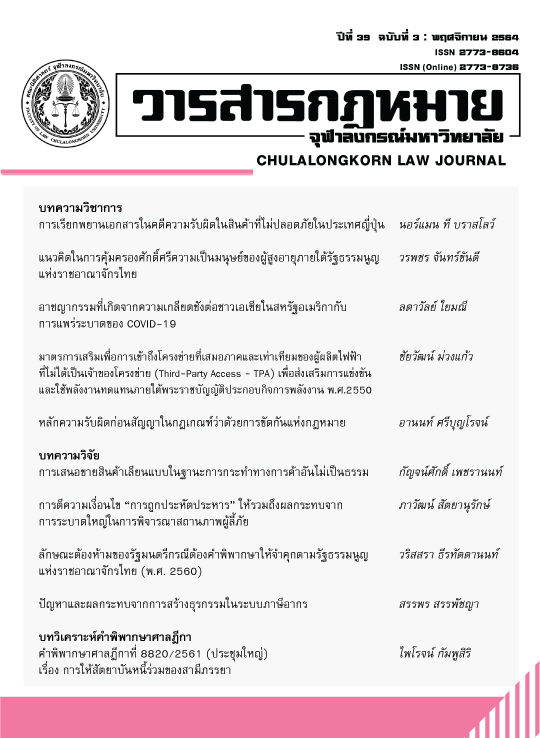อาชญากรรมที่เกิดจากความเกลียดชังต่อชาวเอเชียในสหรัฐอเมริกา กับการแพร่ระบาดของ COVID-19
Main Article Content
บทคัดย่อ
ตั้งแต่ปี ค.ศ. 2020 ทั่วโลกเผชิญหน้ากับการระบาดของเชื้อไวรัสโรคระบาด COVID-19 ก่อให้เกิดความเสียหายต่อชีวิตของผู้คนและเศรษฐกิจในภาพรวมอย่างมหาศาล โดยเฉพาะในประเทศสหรัฐอเมริกาที่มีสถิติผู้เสียชีวิตเป็นอันดับหนึ่ง การเกิดการแพร่ระบาดดังกล่าวทำให้สถิติอาชญากรรมที่เกิดจากความเกลียดชังต่อชาวจีนหรือชาวเอเชียสูงขึ้นถึงร้อยละ 145 เนื่องจากถูกมองว่าเป็นต้นตอของไวรัสดังกล่าว นำไปสู่การทำร้ายในลักษณะต่าง ๆ อาทิเช่น การทำร้ายร่างกาย หรือการดูถูกเหยียดหยามด้วยประทุษวาจา (Hate Speech) แม้ในสหรัฐอเมริกาจะมีกฎหมายอาชญากรรมที่เกิดจากความเกลียดชังบังคับใช้ทั้งในระดับประเทศและระดับมลรัฐอยู่แล้ว แต่ก็ไม่เพียงพอที่จะจัดการกับอาชญากรรมในช่วงการแพร่ของโรคระบาดได้ ประเทศสหรัฐอเมริกาจึงมีการผ่านร่างกฎหมาย COVID-19 Hate Crime Act เพื่อดำเนินการกับอาชญากรรมที่เกิดจากความเกลียดชังในช่วงการแพร่ระบาดของโรค COVID-19 เป็นการเฉพาะเจาะจง โดยกฎหมายดังกล่าวได้ให้อำนาจแก่หน่วยงานราชการในการเก็บข้อมูลไปจนถึงการให้ความรู้ และจัดโปรแกรมเปลี่ยนแปลงพฤติกรรมของผู้กระทำความผิด
Article Details
ลิขสิทธิ์และเนื้อหาในเว็บไซต์ของวารสารกฎหมาย (รวมถึง โดยไม่จำกัดเฉพาะ เนื้อหา รหัสคอมพิวเตอร์ งานศิลป์ ภาพถ่าย รูปภาพ ดนตรีกรรม โสตทัศนวัสดุ) เป็นกรรมสิทธิ์ของวารสารกฎหมาย และผู้ได้รับการโอนสิทธิทุกราย
1. วารสารกฎหมาย ให้อนุญาตให้คุณใช้สิทธิอันไม่เฉพาะเจาะจงที่สามารถถูกถอนเมื่อใดก็ได้ โดยไม่มีค่าใช้จ่าย ในการ
- เยี่ยมชมเว็บไซต์และเอกสารในเว็บไซต์นี้ จากคอมพิวเตอร์หรือเครื่องมือสื่อสารผ่านเว็บบราวเซอร์
- คัดลอกและจัดเก็บเว็บไซต์และเอกสารในเว็บไซต์นี้บนลงคอมพิวเตอร์ของคุณผ่านระบบความจำ cache
- สั่งพิมพ์เอกสารจากเว็บไซต์นี้สำหรับการใช้ส่วนตัวของคุณ
- ผลงานที่ได้รับการตีพิมพ์โดยวารสารกฎหมาย จุฬาลงกรณ์มหาวิทยาลัย ถูกคุ้มครองภายใต้ Creative Commons Attribution 4.0 International License ซึ่งอนุญาตให้ทุกคนสามารถคัดลอก แจกจ่าย ดัดแปลง ส่งต่อ ผลงานได้ ก็ต่อเมื่อผลงานและแหล่งข้อมูลได้รับการอ้างอิงอย่างเหมาะสม
2. วารสารกฎหมาย จุฬาลงกรณ์มหาวิทยาลัย สงวนสิทธิ์ไม่อนุญาตให้คุณใช้สิทธิอื่นใดที่เกี่ยวข้องกับเว็บไซต์และเอกสารบนเว็บไซต์นี้ เช่น การคัดลอก ดัดแปลง เปลี่ยนแปลง ส่งต่อ ตีพิมพ์ แจกจ่าย เผยแพร่ จัดแสดงในที่สาธารณะ ไม่ว่าจะในรูปแบบใดก็ตาม ซึ่งเว็บไซต์หรือเอกสารบนเว็บไซต์ โดยไม่อ้างอิงถึงแหล่งข้อมูลหรือโดยไม่ได้รับอนุญาตเป็นลายลักษณ์อักษรจากวารสารกฎหมาย จุฬาลงกรณ์มหาวิทยาลัย
3. คุณอาจขออนุญาตที่จะใช้เอกสารอันมีลิขสิทธิ์บนเว็บไซต์นี้โดยการเขียนอีเมลล์มายัง journal@law.chula.ac.th
4. วารสารกฎหมาย จุฬาลงกรณ์มหาวิทยาลัย เข้มงวดกับการคุ้มครองลิขสิทธิ์อย่างมาก หากวารสารกฎหมาย จุฬาลงกรณ์มหาวิทยาลัยพบว่าคุณได้ใช้เอกสารอันมีลิขสิทธิ์บนเว็บไซต์นี้โดยไม่ถูกต้องตามการอนุญาตให้ใช้สิทธิ ดังที่กล่าวไปข้างต้น วารสารกฎหมาย จุฬาลงกรณ์มหาวิทยาลัยอาจดำเนินคดีตามกฎหมายต่อคุณได้ เพื่อเรียกร้องค่าเสียหายที่เป็นตัวเงินและคำขอชั่วคราวให้คุณหยุดการใช้เอกสารดังกล่าว ทั้งนี้ คุณอาจถูกสั่งให้ชดใช้ค่าใช้จ่ายใดๆ ที่เกี่ยวข้องกับการดำเนินการตามกฎหมายนี้
หากคุณพบเห็นการใช้เอกสารอันมีลิขสิทธิ์ของวารสารกฎหมาย จุฬาลงกรณ์มหาวิทยาลัย ที่ขัดหรืออาจขัดต่อการอนุญาตให้ใช้สิทธิดังที่ได้กล่าวไปข้างต้น โดยเชื่อว่าได้ละเมิดลิขสิทธิ์ของคุณหรือของผู้อื่น สามารถร้องเรียนมาได้ที่ journal@law.chula.ac.th


